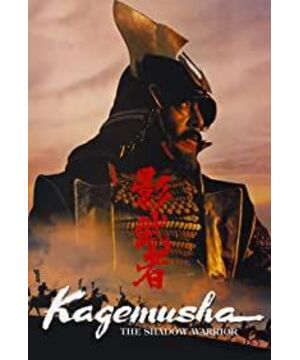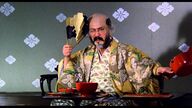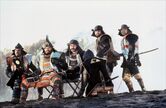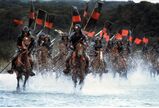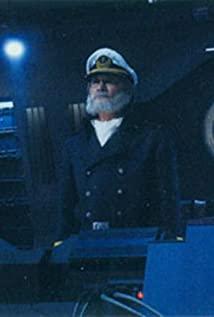Without hesitation, Kurosawa Akira is the "godfather" of Japanese movies. When it comes to Japanese film achievements, he is a point that can never be circumvented. He is even called "Kurosawa Emperor" in China. Zeming is also the "godfather" who has a profound influence on the entire Asian film industry. Later, the Hong Kong film's police films and gangster films were highly developed, and the best of the fifth generation of directors in China integrated Asian culture into their films, and it was inseparable from Kurosawa. Ming's influence behind it.
Later, "Hollywood genius" Quentin Tarantino, Wu Yusen who broke into Hollywood, and "Oh Kitano Takeshi" have repeatedly mentioned that his film spirit and philosophy were largely influenced by the Japanese director; Among them, director Takeshi Kitano deeply inherited Kurosawa's film philosophy in his films, and was even called "the only hope in Kurosawa's eyes."
In 1980, "Kurosawa Emperor" had not made a movie for five years. The film before it had poor reviews, and he was filming "Tiger!" Tiger! Tiger! 》During the period, due to his independence of personal style, he had trouble with the issuing company. At this time, it is difficult for him to find new investors to invest in his new movies. He was experiencing the downturn in his life, and even thought of suicide during this period.
Until he met his two "admirers"-Coppola and George Lucas: Coppola, the great director who created the "Godfather" trilogy, told the audience what is meant by the romance and romance of men. Lonely; another George Lucas is the "godfather" of "Star Wars" and the founder of Lucasfilm. The achievements and status of these two individuals can undoubtedly be described as "Taishan" and "Beidou" in the world film pattern at that time and even now.
In 1980, Coppola happened to come to Japan for a visit. When he learned that the master he admired was in a difficult period, he immediately pulled his friend George Lucas to help his predecessors get out of the predicament. The two of them jointly acted as producer, and invested in Dongbao from FOX at the time. With the blessing of this lineup, Kurosawa produced his first color movie-"Shadow Warrior". The film also unceremoniously won the Palme d'Or at the 33rd Cannes Film Festival and was nominated for the best foreign language film Oscar that year.
(Interlude: Today, Lucasfilm and FOX have joined the Disney Family Bucket; and this year, "The Thief Family" directed by Hirokazu Edema, also from Japan, won the Palme d'Or.)
The shadow warrior, to put it simply, is the "shadow" of the samurai, a special profession that serves as a substitute for the samurai: he not only needs to be similar in appearance, but also needs to imitate himself psychologically and behaviorally. In the history of the Japanese Warring States period, there are three people who love to use Kagemu the most and are the most famous-Shingen Takeda, Ieyasu Tokugawa, and Shinshige Sanada (Yukimura), and these three people are inextricably linked. I wonder if it is history. Good luck: Takeda Shingen once beat Tokugawa Ieyasu in Mikatahara and wanted to kill himself; and in Tokugawa Ieyasu’s legend of Kagemusi, it is even said that Tokugawa Ieyasu was killed in a certain battle, and later became the general of the Japanese army. The Tokugawa shogunate was its shadow warrior Sorada Motoshin; the tragic hero "Japan's first soldier" Sanada Yukimura, used the shadow warrior tactics in the Osaka Summer Campaign, and Tokugawa Ieyasu suffered a lot.
In 1573, Shingen Takeda died on the road to Shangluo. (Shangluo means going to Kyoto, which is similar to the meaning of "went for the trip" and "hegemony" in Chinese)
A large part of Takeda Shingen’s personality charm comes from his strategic thinking, "Fenglin Volcano": It is as swift as the wind, it is like a forest, invading like fire, and immovable like a mountain. It comes from the military battle chapter of "The Art of War" by Takeda Shingen. As the basic idea of building the army. The meaning of "mountain" is emphasized in the movie. Shingen once said that "man is a city, man is a wall, and man is a Hori." This sentence is not only Shingen's profound grasp of "human heart", and it can also define "human" as The personal cult of "Takeda Shingen"-Takeda Shingen is a "mountain". When fighting, he holds an army fan, strategizes, and wins thousands of miles away. He does not die, or "If he can continue to exist", the Takeda family will not perish, and the Siling Banner will never fall.
Therefore, when Shingen-sama died from an accidental injury, there must be someone to replace his "flag" general position and continue to exert his coercion.
The main role of the shadow warrior in this movie is quite theatrical of "the dead Zhuge goes to live Zhongda". When Honda's troops rushed to the main line of the Takeda family, they saw the "Takeda Shingen" holding the army. Fan, as stable as Mount Tai, could not help but immediately return to the horse to retreat.
Although a person is dead, he continues to influence the trend of the entire battle through his "shadow", and people can't help but sigh how terrifying the "majestic legacy" Takeda Shingen left behind during his lifetime. After confirming the news of Shingen’s death, Oda Nobunaga couldn’t help but danced the "Tatsumori" dance to commemorate the passing of this hero: "For fifty years in the world, looking at the rise and fall of the world, it seems like a dream. Once alive, how can it not be? Destroy?" At the same time laughing at himself, Shingen Takeda died two years ago, and a shadow warrior actually fooled the tiger wolf around for so many years.
"When people exist, shadows will exist. When people die, how should shadows live?" From a thief about to be beheaded to a shadow warrior, a shadow warrior who releases the Buddha is reborn, but it is a rebirth that abandons the self. Since then, his life has been manipulated by others, with every move and a cluster of imitations of the big man who died. Who is he now?
In his dream, he saw the resurrected Xinxuan approaching him with a sword. He turned around in fear and fled, just as he had seen. When Xinxuan disappeared, he wanted to look for him again, but he was looking for him in the endless void. If you don't, you can only be at a loss, let the Buddha fall into the hell, it is difficult to reincarnate.
The wonderful thing in the movie is the portrayal of Takeda Katsuyoshi, which reflects from the side that Shingen Takeda is good at strategic strategies, but he failed to handle the "father-son relationship" and his own heir issues, which indirectly led to the demise of the family.
The death of Shingen in history is complicated, and it is more recognized that Shingen Takeda died of tuberculosis. And why suffering from tuberculosis has a certain relationship with Takeda Katsuyori. Shingen’s first marriage was arranged by the family, and the object was the daughter of the Sanjo clan, a high-ranking official in Kyoto. Although the Sanjo clan gave birth to the eldest son Takeda Yoshinobu, the marriage relationship between the two was not harmonious; and Shiro Katsuri’s The birth mother Suwa Hime is Shingen’s favorite concubine. The two spent a happy time at Lake Suwa in South Shinano. Suwa Hime suffers from pulmonary tuberculosis and physical weakness. He died early after giving birth and was also intimacy. His contact and transmitted his disease to Xin Xuan. When reading the novel of the same name by Nitta Jiro's "Takeda Shingen", the love for this piece of glue is quite deep, and it seems that this tiger's only show of tenderness.
For the eldest son, Yixin, because of his dislike for his mother, Xinxuan has never waited to see him, and even executed him directly during the rebellion. This incident made Xinxuan on the basis of the "father-killing" basis. "The notoriety of "; and the fourth son Katsurai, because he left Jisuwa in his early years, he could not inherit the Takeda family. In order to compensate for the son of his favorite concubine, Shingen chose Katsurai's son as his heir; every time he went to fight , Xinxuan must be defeated after defeating Lai, which is enough to reflect Xinxuan's paternal love for him.
However, Katsurai has always been worried about his inability to directly inherit the Takeda family, and he always stood behind his back and watched his father. This is due to his distrust of himself. After his father died, he left behind a large number of high-ranking retainers. Check him and make him eager to prove himself. In the movie, the contradiction between Katsurai and the "heavy ministers" such as scenes in Shan County slowly becomes irreconcilable. It was this psychological distortion that made him slowly lose his composure, and finally led the Takeda family into an irreversible abyss.
In the end, the movie came to an end-the battle of Changxiao.
On one side, the coalition forces of Oda Nobunaga and Tokugawa Ieyasu deployed iron cannons behind the horse-proof fence, using the latest "three-stage" tactics; on the other side, the main force of the Takeda family was the red horse riding team. This is an epoch-making battle, which is a direct confrontation between hot and cold weapons; although I personally do not want to admit it, this war eventually evolved into a unilateral slaughter. It is difficult for the cavalry to break through the fence. Each wave of shooting will cause many knights to fall into the charge. When the gunpowder dissipated, the ground was densely scattered with soldiers, horses, and the banner of "Fenglin Volcano" from the Takeda family.
The expelled shadow warrior hid in the distance of the battlefield, watching the collapse of the army. Under the leadership of Xin Xuan, this army was once extremely brave and beautiful, but now it is now being wiped out by a cowardly enemy hiding in the dark. In his eyes, it seemed indignation and mourning. The most painful thing was helpless grief.
This is a splendid martyrdom of Eastern classical style, martyrdom for Takeda Shingen, for his soul, and for Bushido.
Kagemusha served as the last martyr, and he and Fenglinhuo sank in the water.
Kurosawa Akira's "Shadow Samurai" is his elegy to Bushido. When the era of hot weapons comes, the samurai is facing the muzzle pointed at him, and can still hold the sword tightly, and go to death; and when the last samurai falls, Who can pick up the sword again?
View more about Kagemusha reviews


